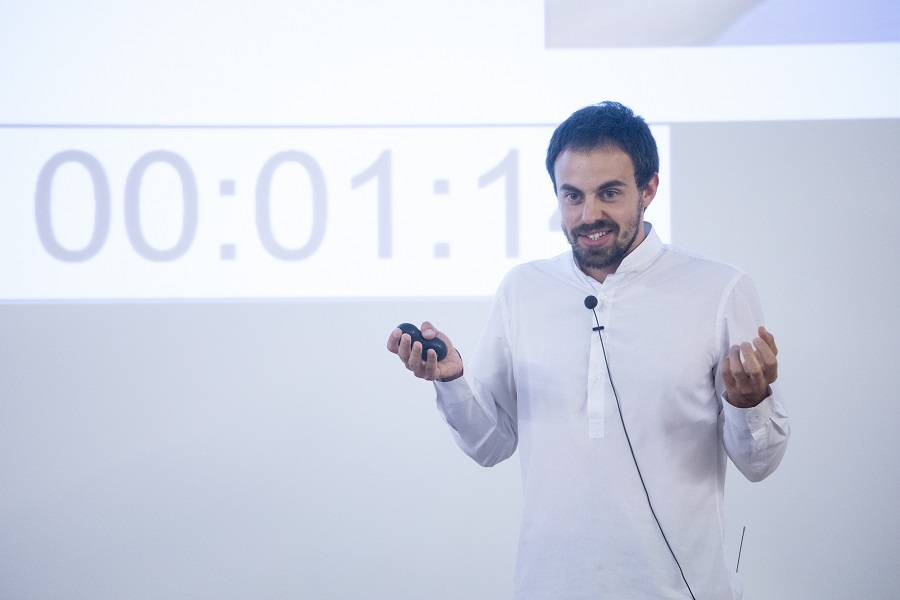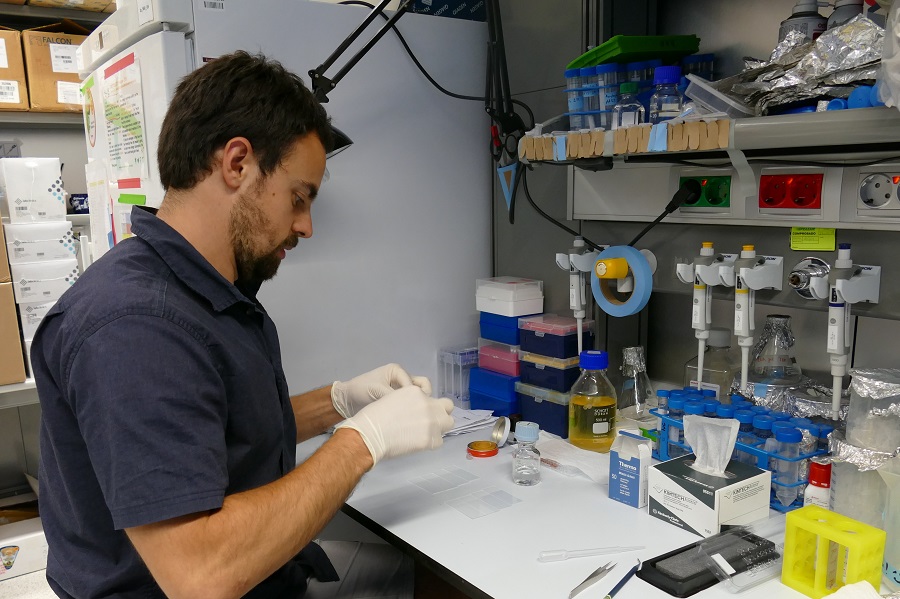"It is important to bring scientists closer to other people and to find a common language"
"It is important to bring scientists closer to other people and to find a common language"
We are talking to Artem Komissarov,, the winner of the fourth edition of the “Present your thesis in 4 minutes” competition, in which PhD students have to explain their research to a lay audience in four minutes.

Artem Komissarov is from Ukraine. He did his bachelor’s degree in the capital, Kyiv, and then he moved to Heidelberg, Germany, to do a master’s degree. He then came to Barcelona to do a PhD. He was looking for a very specific project because he wanted to study RNA transport in neurons. He is in his third year of his PhD in the group led by Sebastian Maurer at the Center for Genomic Regulation (CRG). On 14 May he won first prize in the Rin4’ (Research in 4 minutes) competition and, subsequently, on 4 June, he also won the Catalan contest “Present your thesis in 4 minutes”.
- What encouraged you to go in for the Rin4’ competition?
Usually, when researchers give scientific presentations, we go into tiny details. It is quite easy to lose the focus of what is the most important part of the research. Rin4’ is a challenge because it makes you explain very complicated things in an easy manner, that everyone can understand. I remember the situation that made me think about the importance of science communication. When I was doing my master’s degree, I was flipping drosophila flies from one vial to another while talking to my mum by Skype. She asked why was I doing it and I explained that I wanted to cross some genes and see what happened in the next generation, but she wondered why it was important. I had to think for a while before I could explain. My point is that It can be hard to find the words and to find the central, most important idea.
- What does winning the competition mean to you?
First of all, it is a personal challenge. It was my second year participating, and since last year I have thought about what I could improve. This year I changed a bit the way I’m presenting, although the project is the same. Last year I focused on explaining the chemistry behind my research. However, this year I have tried to explain the main concepts and how I’m doing the research, and it seems clearer to people now. The competition was fun and I admired the other people at Rin4’ because I saw how much work is done behind their presentations and how complicated it is. And, for some of them, I was really mesmerized by how easy they explain extremely complex things.
It can be hard to find the words and to find the central, most important idea.
- Why do you think science communication is important? Have you participated in any other such activities?
I think science communication is indeed important. Sometimes we can see politicians cutting funding for research, just because they don’t understand why basic science is so essential. That is why it is relevant to bring scientists closer to other people, to find a common language so the public can get interested. And, at the same time, we can also see what drives people’s interest. So this dialogue is relevant at all levels. I did a science communication activity last year. It was a talk in the Science Slam, a science communication contest in a pub. I liked it, trying to arouse enthusiasm in people’s eyes was fun.
- Can you explain briefly what your research is about?
 Cells that form the brain, the neurons, are very long. For us to learn things or memorize, they need to transport many molecules from place to place over the long distances and they need very specific mechanisms to do so. We are trying to understand these mechanisms, how they work on the level of separate molecules, to learn which molecule is needed for which function.
Cells that form the brain, the neurons, are very long. For us to learn things or memorize, they need to transport many molecules from place to place over the long distances and they need very specific mechanisms to do so. We are trying to understand these mechanisms, how they work on the level of separate molecules, to learn which molecule is needed for which function.
In the past, it was studied by typical methods, taking the cells and trying to understand what’s happening inside. The problem is that there are millions of molecules in the cell and it’s hard to separate different functions that are always connected somehow. Instead, we are doing an in vitro approach, so we take these molecules separately out of the cell, and in this way, we control the conditions. We can really take all the combinations of molecules and see which one is doing what. This is what I’m doing, it’s called molecular reconstitution, so we are trying to rebuild the architecture and the real physiological mechanisms of the cells, but we do it artificially, under a microscope.
- What are the consequences if the transport goes wrong?
There are some mental retardation disorders which happen when some of these molecules are not located in a specific place, at a specific time. We don’t know all the stages of this complex process of transport. The hope is to understand it, then we can actually find some treatment because you cannot fix the bike without understanding how it works. We are trying to copy this bike piece by piece to understand what is happening inside.
- Was it clear to you that you wanted to start a PhD?
Yes, so I did master’s degree before, which is more like training and then I wanted to apply the new skills and knowledge. Also during a master’s degree, you study lots of different topics and you can find out what really interests and excites you. I found my topic, molecular transport in neurons, so I just had to find the lab to fulfil my potential.
I liked the experience and trying to arouse enthusiasm in people’s eyes was fun.
- What are your plans for the future?
After finishing my PhD, I think I would like to move closer to biotechnology and industry so that the research can also be applied. Now I’m learning biochemistry and basic science, how things work in principle, but it would be nice also to use this knowledge and these skills to develop products for human health.
- What advice would you give to people who are beginning their thesis now?
To keep focused on what drives you, what makes you interested. Over time, a principal investigator can suggest many ideas and side projects, and sometimes it is hard to stay focused on what you really want. I guess it’s important not to be too shy and not to be afraid to propose something or criticize the project. I guess trying to be brave enough in the right situation.
